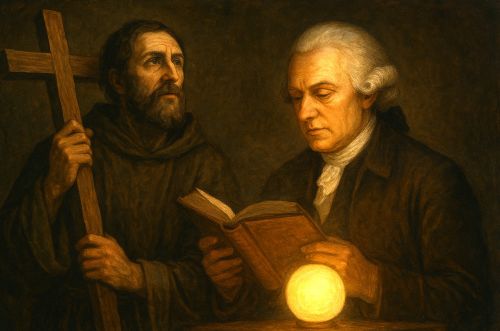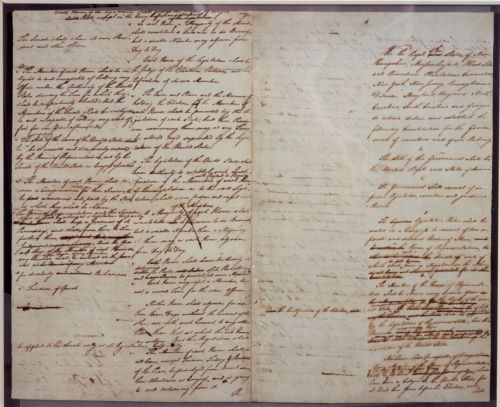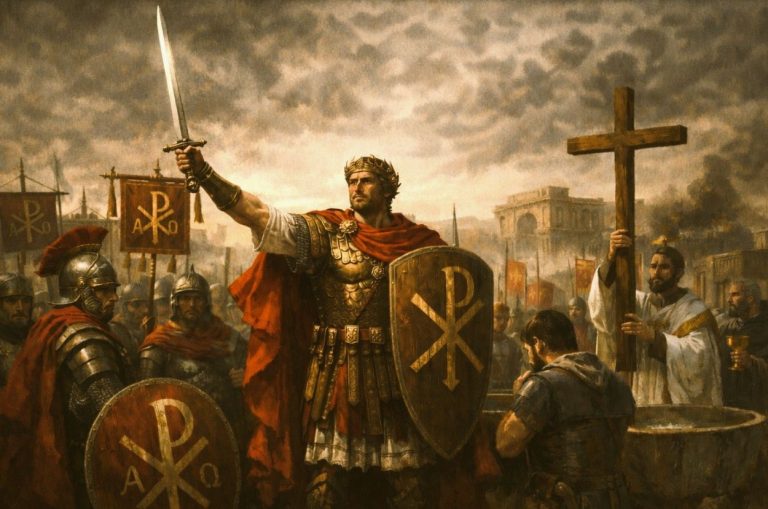

By transferring moral and political legitimacy from revelation to reason, the Enlightenment recast the relationship between the human mind and the world it sought to understand.

By Matthew A. McIntosh
Public Historian
Brewminate
Introduction: The Age of Reason and the End of Theocracy
The Enlightenment was not merely an intellectual awakening but a civilizational pivot. Emerging from the late seventeenth century’s turbulence of religious wars and dogmatic certainty, it marked a decisive turn toward rational inquiry as the supreme arbiter of truth. Across Europe, thinkers sought to replace inherited faith with knowledge derived from observation, experiment, and reflection. Religion and superstition, long enthroned as the ultimate authorities over nature and conscience, began to yield before the disciplined confidence of reason. As Dorinda Outram notes, the Enlightenment was not a single creed but a constellation of critical attitudes: skepticism toward revelation, faith in human progress, and belief that the world could be understood without appeal to miracle or myth.1
This new intellectual orientation reshaped every domain of human thought. Philosophers like René Descartes, John Locke, and Isaac Newton redefined the relationship between mind, matter, and morality, grounding knowledge in empirical evidence and the logic of cause and effect. The same spirit animated a political reformation: Locke’s Two Treatises of Government offered a secular foundation for political legitimacy, and Montesquieu’s Spirit of the Laws proposed reasoned limits on power. In their wake, clerical authority waned and theocratic systems lost moral and institutional dominance. By the mid-eighteenth century, the Enlightenment had become, in Peter Gay’s phrase, “the rise of modern paganism,” a reimagining of human destiny through intellect rather than revelation.2
When Enlightenment thought crossed the Atlantic, it found fertile ground in a society already loosening the grip of Puritan orthodoxy. A century after the colonial theocracies of New England had faded, American thinkers began to construct a republic grounded not in divine ordinance but in natural rights, social contract, and public reason. The framers of the Declaration of Independence and the Constitution drew not upon the Bible but upon the rational philosophy of Locke, Montesquieu, and Voltaire. The founding generation, heirs to this intellectual revolution, transformed Enlightenment reason into a political reality, a secular republic governed by the authority of the people rather than the will of God.
In tracing this evolution from faith to reason, from revelation to rational liberty, one sees the Enlightenment not as a rejection of belief but as its reordering. It recast the moral and intellectual landscape of the West, defining the conditions under which the United States would emerge, a nation conceived in liberty and dedicated, above all, to the sovereignty of reason.
The Intellectual Transformation in Europe

The Enlightenment’s rise in Europe marked a profound reorientation of human thought. Its leading figures sought not merely to critique inherited beliefs but to construct an entire worldview grounded in reason and evidence. René Descartes’ Discourse on Method (1637) inaugurated this revolution by establishing systematic doubt as a path to certainty. His insistence that truth must rest upon clear and distinct ideas, rather than the authority of church or tradition, inaugurated a new intellectual independence.3 Descartes’ rationalism was soon joined by the empiricism of John Locke, whose Essay Concerning Human Understanding (1690) rejected innate ideas and argued that all knowledge derived from sensory experience.4 These foundations, rational deduction and empirical observation, formed the twin pillars of Enlightenment epistemology.
Isaac Newton’s Principia Mathematica (1687) transformed this philosophical movement into a scientific one. Newton demonstrated that the universe could be understood as a system governed by discoverable, consistent laws rather than divine caprice.5 His physics offered a model for the new rational order: the cosmos itself was intelligible to human reason. This mechanistic vision reverberated far beyond science, inspiring a generation of thinkers to apply the same principles of observation and verification to politics, ethics, and society.6
By the early eighteenth century, a network of intellectuals across Europe had embraced reason as the defining measure of truth. In England, Locke’s Two Treatises of Government grounded legitimate authority in the consent of the governed rather than divine right, articulating a vision of government as a human construct designed to protect natural rights.7 In France and the Dutch Republic, more radical currents emerged. Baruch Spinoza’s Ethics and Denis Diderot’s Encyclopédie embodied a secular humanism that explicitly challenged ecclesiastical power.8 Voltaire’s relentless critique of clerical dogma and his defense of toleration reflected a new moral confidence, that ethics could stand without theology.9
This intellectual transformation was not confined to philosophers and scientists but spread through the expanding “Republic of Letters,” a transnational network of correspondence and publication that united scholars, printers, and reformers. Through journals, salons, and academies, knowledge circulated more freely than ever before. As Jonathan Israel has shown, the dissemination of Enlightenment ideas through these informal structures created a genuinely international culture of reason.10 The result was a Europe increasingly skeptical of revelation, increasingly confident in the human mind’s capacity to order its own world.
Thus, by the mid-eighteenth century, the Enlightenment had succeeded in redefining the basis of truth. Knowledge was no longer the province of theologians or monarchs but of reasoned inquiry and empirical verification. This intellectual emancipation laid the groundwork for the political revolutions that would follow and prepared the philosophical soil from which the American experiment would grow.
The Eclipse of Superstition and the Rise of Scientific Humanism

The Enlightenment’s critique of superstition represented one of the most decisive cultural shifts in Western history. By the late seventeenth and early eighteenth centuries, the authority of religious institutions (long sustained by miracle, mystery, and fear) was giving way to the authority of observation and proof. Superstition, once seen as a necessary moral restraint, was increasingly condemned as an impediment to progress. Enlightenment thinkers distinguished faith from fanaticism and sought to purge human understanding of error rooted in custom or clerical command. As Margaret C. Jacob observes, the period’s intellectual energy lay in its conviction that knowledge must arise from the empirical and the rational, not the mystical.11
This new rationalism took its clearest form in the rise of scientific humanism, a philosophy that located moral and intellectual authority in human capacities themselves. Isaac Newton’s natural philosophy had revealed a world operating according to universal laws, and those same principles inspired moral philosophers to search for laws of human nature.12 Thinkers such as David Hume and Adam Smith argued that sympathy, sociability, and justice were natural dispositions rather than divine prescriptions.13 The moral order, they maintained, did not depend upon revelation but upon reason and the shared emotions of humankind. This reorientation redefined virtue as a civic quality grounded in empathy and social benefit, inaugurating a secular ethics that would profoundly shape the modern age.
The transformation extended beyond philosophy to culture and public life. The salon and the coffeehouse became the crucibles of reasoned conversation, where ideas circulated outside the pulpit and the university. In France, the Encyclopédie of Denis Diderot and Jean le Rond d’Alembert sought to compile all human knowledge under the guidance of reason, rejecting the scholasticism of medieval theology.14 Contributors such as Voltaire, Rousseau, and Montesquieu helped make the pursuit of knowledge a collective enterprise, a democratic ideal in which intellectual progress was accessible to all. These institutions embodied the Enlightenment conviction that truth required no sanction from throne or altar.
Scientific humanism also altered perceptions of nature itself. No longer viewed as a fallen or corrupt creation awaiting redemption, the natural world became a realm of lawful harmony discoverable through inquiry. The shift from providence to process encouraged an optimistic view of human potential, what Alexander Pope called “the proper study of mankind.”15 As Dorinda Outram notes, this optimism did not entail the rejection of spirituality, but its redefinition: the divine was increasingly conceived as immanent within natural law rather than transcendent above it.16 Nature became both the subject of study and the moral exemplar for rational order.
The decline of superstition did not proceed without resistance. Religious authorities condemned the Encyclopédie and censored works deemed impious or dangerous. The Catholic Church placed Voltaire’s writings on the Index Librorum Prohibitorum, and several Enlightenment figures faced exile or imprisonment. Yet persecution only underscored the intellectual shift already underway. The Enlightenment’s confidence in reason proved resilient precisely because it could justify itself without revelation; it could argue from evidence, not faith.17 By insisting that progress depended on education and freedom of thought, Enlightenment humanists redefined the meaning of salvation itself: not deliverance from sin, but liberation from ignorance.
By the mid-eighteenth century, the rational critique of superstition had transformed Europe’s intellectual climate. The sciences flourished under patronage from secular academies, censorship gradually loosened, and philosophy replaced theology as the dominant form of inquiry among the educated elite. The triumph of reason was not the extinction of belief but its subordination to evidence.18 That transformation prepared the way for a new political philosophy, one that would soon cross the Atlantic and take root in a nation founded not on revelation but on the rights of man.
The Atlantic Transmission of Enlightenment Ideas

By the mid-eighteenth century, the Enlightenment had become a transatlantic phenomenon. Its ideas, carried across oceans by books, correspondence, and travelers, reshaped the intellectual landscape of the American colonies. European works circulated through private libraries, coffeehouses, and learned societies, where they found eager audiences among colonial elites. Benjamin Franklin, a printer as well as a philosopher, exemplified this cultural bridge. His engagement with European thinkers, particularly David Hume and Joseph Priestley, demonstrated how transnational exchange created a shared vocabulary of reason, progress, and human improvement.19 Through these networks, the colonial mind absorbed a rationalist ethos that valued inquiry over revelation and civic virtue over inherited faith.
The process of transmission was neither accidental nor purely scholarly. The circulation of Enlightenment literature was part of a deliberate attempt by the colonies’ educated class to fashion themselves as participants in a wider republic of letters.20 Book importers and publishers brought volumes of Locke, Voltaire, and Montesquieu into Boston, Philadelphia, and Williamsburg. Franklin’s Library Company of Philadelphia, founded in 1731, became a central institution for this intellectual exchange.21 By mid-century, colonial newspapers reprinted excerpts from European periodicals, while almanacs and pamphlets diffused scientific and philosophical knowledge to a broader public. The result was a growing conviction that rational improvement was the natural destiny of humankind, a conviction that would soon translate into revolutionary politics.
Within this environment, religion itself underwent transformation. The Great Awakening of the 1730s and 1740s briefly reasserted emotional piety, yet even its preachers unwittingly reinforced the individualism central to Enlightenment thought.22 In its aftermath, theology increasingly yielded to moral philosophy as the preferred means of understanding virtue and law. Educated Americans began to approach the Bible not as infallible revelation but as one moral text among many, to be interpreted in light of reason and experience.23 This evolution paralleled the secularization already advanced in Europe and created the intellectual space in which figures like Jefferson and Franklin could reconcile personal belief with philosophical skepticism.
The influence of specific Enlightenment writers on the American founding generation is unmistakable. Locke’s theory of natural rights and government by consent shaped Jefferson’s drafting of the Declaration of Independence, while Montesquieu’s analysis of political moderation informed Madison’s conception of checks and balances.24 Voltaire’s defense of toleration and Rousseau’s notion of civic virtue enriched the ethical vocabulary of the Revolution, even when stripped of their European contexts.25 The radical implications of these ideas (popular sovereignty, religious liberty, and the supremacy of law over dogma) transcended denominational lines. They provided a philosophical foundation for a republic conceived not in covenant with God but in compact among free and rational citizens.
By the eve of independence, the colonies had become laboratories of Enlightenment principles. The proliferation of debating societies, scientific associations, and experimental clubs testified to an emerging civic culture governed by reasoned discourse rather than clerical decree.26 When Thomas Paine published Common Sense in 1776, he was not introducing new ideas but translating decades of Enlightenment philosophy into the idiom of political urgency. The American Revolution thus represented the culmination of an intellectual migration, the triumph of a secular, rational ideal of governance carried from Europe’s salons to America’s public squares.
Enlightenment Principles in the American Founding

When the American colonies declared independence, their justification was expressed not through divine invocation but through rational principle. The Declaration of Independence proclaimed truths “self-evident,” grounded in “the Laws of Nature and of Nature’s God.” The phrase, as Garry Wills has demonstrated, owed more to the natural philosophy of Locke and Newton than to biblical theology.27 The appeal to “nature’s laws” represented a secular formulation of universal moral order, intelligible to reason alone. Jefferson, educated in Enlightenment science and moral philosophy, articulated rights as inherent in human existence rather than conferred by revelation or ecclesiastical authority.28 The political theology of the Puritans had thus yielded to a civil theology of reason.
This rational foundation extended to the structure of government itself. The framers of the Constitution sought to create a system that reflected empirical understanding of human nature: ambitious, fallible, and self-interested. James Madison’s argument in Federalist No. 51 that “ambition must be made to counteract ambition” reveals the Enlightenment influence of Montesquieu’s doctrine of separation of powers.29 The new government was conceived not as the instrument of divine order but as an experiment in balancing forces, a mechanism designed according to the same principles of equilibrium that animated Enlightenment science. The Founders regarded politics as an art of design rather than a theater of providence.
Religion, though not eradicated, was deliberately subordinated to the authority of law and conscience. The First Amendment’s prohibition of establishment reflected both pragmatic pluralism and philosophical conviction.30 Madison’s Memorial and Remonstrance Against Religious Assessments argued that religion “can be directed only by reason and conviction, not by force or violence,” a claim perfectly aligned with Enlightenment notions of liberty of conscience.31 Jefferson’s Virginia Statute for Religious Freedom further embodied this secular ideal by asserting that one’s belief or disbelief “neither picks my pocket nor breaks my leg.”32 The Founders’ emphasis was not on faith’s exclusion but on its voluntary character, echoing the Enlightenment insistence that morality and civic order required no supernatural enforcement.
The new republic also reflected the Enlightenment’s confidence in education as the safeguard of liberty. Jefferson envisioned a network of schools that would “illuminate, as far as practicable, the minds of all,” enabling citizens to govern themselves rationally.33 The founding generation believed that ignorance was the true enemy of freedom and that an informed public could resist tyranny without priest or monarch. In this conviction lay a direct inheritance from Diderot’s Encyclopédie and Condorcet’s advocacy of universal education as the foundation of progress.34 The American university and public school systems thus became secular temples of the Enlightenment’s creed of reason.
The language of Enlightenment also permeated debates about slavery, citizenship, and human equality, though its promises were unevenly realized. Figures such as Benjamin Franklin and John Adams invoked natural-rights philosophy to condemn bondage as incompatible with rational liberty, while others rationalized exclusion through distorted readings of the same texts.35 The tension between principle and practice revealed both the power and the limits of Enlightenment thought in a world still structured by hierarchy and exploitation. Yet even in contradiction, the universalism of Enlightenment philosophy provided the intellectual tools for later reform. The claim that all men are created equal, however imperfectly applied, remained the moral compass for every subsequent struggle for justice.
The American founding thus stands as the Enlightenment’s most enduring political achievement. Its institutions embodied the faith that reason, not revelation, could secure order and liberty.36 The Constitution, grounded in human consent and designed for rational deliberation, represented a new kind of covenant, one among citizens rather than between man and God. While religion retained deep cultural influence, the philosophical architecture of the republic was unmistakably secular. The Enlightenment had crossed the Atlantic not as a passing current of thought but as the very foundation upon which the American experiment was built.
Conclusion: The Enduring Republic of Reason

The Enlightenment did not abolish faith; it redefined the grounds of belief. By transferring moral and political legitimacy from revelation to reason, it recast the relationship between the human mind and the world it sought to understand. The eighteenth century’s boldest thinkers refused to accept ignorance as destiny or superstition as virtue. They taught that progress was the product of inquiry and that liberty required the freedom to think.37 Out of this intellectual revolution emerged a conception of humanity as capable of moral autonomy, a vision that animated the American experiment in self-government. The nation’s founding documents enshrined not divine decree but rational principle, establishing a secular framework that allowed religious diversity to flourish precisely because no single faith held legal privilege.
The American Republic thus stands as the Enlightenment’s most visible monument. Its Constitution institutionalized doubt, an acknowledgment that human beings are fallible and that power must therefore be checked, divided, and reasoned through deliberation.38 This structural skepticism reflected the same empirical spirit that had guided Newton’s mechanics and Locke’s epistemology: to observe, to test, and to revise. The Founders did not seek perfection but equilibrium, believing, as Madison wrote, that men were not angels and therefore must govern themselves through institutions that channeled passion into order.39 Such realism was the Enlightenment’s political gift: an architecture of liberty grounded in the study of human nature rather than the assertion of divine will.
Yet the legacy of reason remains contested. The resurgence of religious nationalism and the invocation of divine authority in civic life reveal how fragile the Enlightenment’s achievement remains. The rational republic envisioned by Jefferson and Madison depends not merely on laws but on the continual renewal of the habits of mind that created it.40 Education, tolerance, and the courage to question are not static inheritances but ongoing responsibilities. Each generation must decide whether it will sustain a society ruled by evidence and argument or relapse into dogma and fear. The tension between reason and superstition, between inquiry and obedience, remains the central drama of modern democracy.
The Enlightenment’s triumph, then, was never absolute but neither was it transient. Its ideals of rational liberty, empirical truth, and secular governance endure in the institutions and aspirations of the United States. The founders’ greatest act of faith was their faith in reason itself: that humankind, freed from the tyranny of ignorance, could govern through knowledge and conscience.41 That conviction continues to define the American promise, a republic not of revelation, but of the mind.
Appendix
Footnotes
- Dorinda Outram, The Enlightenment (Cambridge: Cambridge University Press, 2019), 4–7.
- Peter Gay, The Enlightenment: An Interpretation (New York: W.W. Norton, 1977), 13.
- René Descartes, Discourse on Method, trans. Donald A. Cress (Indianapolis: Hackett, 1998), 17–19.
- John Locke, An Essay Concerning Human Understanding, ed. Peter H. Nidditch (Oxford: Clarendon Press, 1975), 104–106.
- Isaac Newton, Philosophiae Naturalis Principia Mathematica, trans. Andrew Motte (Berkeley: University of California Press, 1962), 1–3.
- Dorinda Outram, The Enlightenment, 20–23.
- John Locke, Two Treatises of Government, ed. Peter Laslett (Cambridge: Cambridge University Press, 1988), 287–291.
- Jonathan I. Israel, Radical Enlightenment: Philosophy and the Making of Modernity, 1650–1750 (Oxford: Oxford University Press, 2001), 211–215.
- Voltaire, Philosophical Dictionary, trans. Theodore Besterman (London: Penguin Classics, 1972), 142–145.
- Jonathan I. Israel, Enlightenment Contested: Philosophy, Modernity, and the Emancipation of Man, 1670–1752 (Oxford: Oxford University Press, 2006), 9–12.
- Margaret C. Jacob, The Enlightenment: A Brief History with Documents (Boston: Bedford/St. Martin’s, 2001), 5–7.
- Isaac Newton, Opticks: Or, a Treatise of the Reflections, Refractions, Inflections and Colours of Light (New York: Dover, 1952), 370–372.
- David Hume, An Enquiry Concerning the Principles of Morals, ed. Tom L. Beauchamp (Oxford: Clarendon Press, 1998), 173–175; Adam Smith, The Theory of Moral Sentiments, ed. D.D. Raphael and A.L. Macfie (Indianapolis: Liberty Fund, 1982), 45–49.
- Denis Diderot and Jean le Rond d’Alembert, Encyclopédie, ou Dictionnaire raisonné des sciences, des arts et des métiers, 17 vols. (Paris: Briasson, 1751–1772).
- Alexander Pope, An Essay on Man, ed. Maynard Mack (London: Methuen, 1950), 2:18.
- Dorinda Outram, The Enlightenment, 51–54.
- Voltaire, Philosophical Letters, trans. Ernest Dilworth (Indianapolis: Bobbs-Merrill, 1961), 97–99.
- Jonathan I. Israel, Democratic Enlightenment: Philosophy, Revolution, and Human Rights, 1750–1790 (Oxford: Oxford University Press, 2011), 24–27.
- Henry F. May, The Enlightenment in America (New York: Oxford University Press, 1976), 19–22.
- Bernard Bailyn, The Ideological Origins of the American Revolution (Cambridge, MA: Harvard University Press, 1967), 35–39.
- Henry Steele Commager, The Empire of Reason: How Europe Imagined and America Realized the Enlightenment (New York: Doubleday, 1977), 12–14.
- Jon Butler, Awash in a Sea of Faith: Christianizing the American People (Cambridge, MA: Harvard University Press, 1990), 98–102.
- Henry F. May, The Enlightenment in America (New York: Oxford University Press, 1976), 51–55.
- John Locke, Two Treatises of Government, ed. Peter Laslett, 350–352; Charles de Montesquieu, The Spirit of the Laws, trans. Anne M. Cohler, Basia C. Miller, and Harold S. Stone (Cambridge: Cambridge University Press, 1989), 155–158.
- Voltaire, A Treatise on Toleration, trans. Brian Masters (London: Penguin Classics, 2016), 74–77; Jean-Jacques Rousseau, The Social Contract, trans. Maurice Cranston (London: Penguin Classics, 1968), 89–91.
- Gordon S. Wood, The Radicalism of the American Revolution (New York: Vintage Books, 1991), 48–52.
- Garry Wills, Inventing America: Jefferson’s Declaration of Independence (New York: Vintage Books, 1978), 195–198.
- John Locke, An Essay Concerning Human Understanding, 412–415.
- Charles de Montesquieu, The Spirit of the Laws, 156–159; James Madison, The Federalist Papers, ed. Clinton Rossiter (New York: Signet Classics, 2003), 318–320.
- Henry Steele Commager, The Empire of Reason, 44–47.
- James Madison, “Memorial and Remonstrance Against Religious Assessments,” in The Papers of James Madison, ed. William T. Hutchinson et al. (Chicago: University of Chicago Press, 1962), 8:295–296.
- Thomas Jefferson, Notes on the State of Virginia, ed. Frank Shuffelton (New York: Penguin Classics, 1999), 285–286.
- Thomas Jefferson to George Wythe, August 13, 1786, in The Papers of Thomas Jefferson, ed. Julian P. Boyd (Princeton: Princeton University Press, 1955), 10:276–277.
- Denis Diderot, Political Writings, trans. John Hope Mason and Robert Wokler (Cambridge: Cambridge University Press, 1992), 122–125; Marie-Jean-Antoine-Nicolas de Caritat, Marquis de Condorcet, Sketch for a Historical Picture of the Progress of the Human Mind, trans. June Barraclough (London: Weidenfeld and Nicolson, 1795), 136–138.
- Benjamin Franklin, “Petition from the Pennsylvania Society for the Abolition of Slavery,” February 3, 1790, The Papers of Benjamin Franklin, ed. Leonard W. Labaree et al. (New Haven: Yale University Press, 1976), 33:54–56; John Adams, A Defence of the Constitutions of Government of the United States of America (Philadelphia: Budd and Bartram, 1797), 1:7–9.
- Gordon S. Wood, The Creation of the American Republic, 1776–1787 (Chapel Hill: University of North Carolina Press, 1969), 593–595.
- Dorinda Outram, The Enlightenment, 115–117.
- Gordon S. Wood, The Creation of the American Republic, 597–600.
- James Madison, The Federalist Papers, 322–325.
- Garry Wills, Inventing America, 402–404.
- Henry Steele Commager, The Empire of Reason, 278–281.
Bibliography
- Adams, John. A Defence of the Constitutions of Government of the United States of America. Philadelphia: Budd and Bartram, 1797.
- Bailyn, Bernard. The Ideological Origins of the American Revolution. Cambridge, MA: Harvard University Press, 1967.
- Butler, Jon. Awash in a Sea of Faith: Christianizing the American People. Cambridge, MA: Harvard University Press, 1990.
- Commager, Henry Steele. The Empire of Reason: How Europe Imagined and America Realized the Enlightenment. New York: Doubleday, 1977.
- Condorcet, Marie-Jean-Antoine-Nicolas de Caritat, Marquis de. Sketch for a Historical Picture of the Progress of the Human Mind. Translated by June Barraclough. London: Weidenfeld and Nicolson, 1795.
- Descartes, René. Discourse on Method. Translated by Donald A. Cress. Indianapolis: Hackett, 1998.
- Diderot, Denis. Political Writings. Translated by John Hope Mason and Robert Wokler. Cambridge: Cambridge University Press, 1992.
- Diderot, Denis, and Jean le Rond d’Alembert. Encyclopédie, ou Dictionnaire raisonné des sciences, des arts et des métiers. 17 vols. Paris: Briasson, 1751–1772.
- Franklin, Benjamin. “Petition from the Pennsylvania Society for the Abolition of Slavery.” February 3, 1790. In The Papers of Benjamin Franklin, edited by Leonard W. Labaree et al., Vol. 33. New Haven: Yale University Press, 1976.
- Gay, Peter. The Enlightenment: An Interpretation. New York: W.W. Norton, 1977.
- Hume, David. An Enquiry Concerning the Principles of Morals. Edited by Tom L. Beauchamp. Oxford: Clarendon Press, 1998.
- Israel, Jonathan I. Radical Enlightenment: Philosophy and the Making of Modernity, 1650–1750. Oxford: Oxford University Press, 2001.
- ———. Enlightenment Contested: Philosophy, Modernity, and the Emancipation of Man, 1670–1752. Oxford: Oxford University Press, 2006.
- ———. Democratic Enlightenment: Philosophy, Revolution, and Human Rights, 1750–1790. Oxford: Oxford University Press, 2011.
- Jacob, Margaret C. The Enlightenment: A Brief History with Documents. Boston: Bedford/St. Martin’s, 2001.
- Jefferson, Thomas. Notes on the State of Virginia. Edited by Frank Shuffelton. New York: Penguin Classics, 1999.
- ———. Letter to George Wythe, August 13, 1786. In The Papers of Thomas Jefferson, edited by Julian P. Boyd, Vol. 10. Princeton: Princeton University Press, 1955.
- Locke, John. An Essay Concerning Human Understanding. Edited by Peter H. Nidditch. Oxford: Clarendon Press, 1975.
- ———. Two Treatises of Government. Edited by Peter Laslett. Cambridge: Cambridge University Press, 1988.
- Madison, James. “Memorial and Remonstrance Against Religious Assessments.” In The Papers of James Madison, edited by William T. Hutchinson et al., Vol. 8. Chicago: University of Chicago Press, 1962.
- ———. The Federalist Papers. Edited by Clinton Rossiter. New York: Signet Classics, 2003.
- May, Henry F. The Enlightenment in America. New York: Oxford University Press, 1976.
- Montesquieu, Charles de Secondat, Baron de. The Spirit of the Laws. Translated by Anne M. Cohler, Basia C. Miller, and Harold S. Stone. Cambridge: Cambridge University Press, 1989.
- Newton, Isaac. Opticks: Or, a Treatise of the Reflections, Refractions, Inflections and Colours of Light. New York: Dover, 1952.
- ———. Philosophiae Naturalis Principia Mathematica. Translated by Andrew Motte. Berkeley: University of California Press, 1962.
- Outram, Dorinda. The Enlightenment. Cambridge: Cambridge University Press, 2019.
- Pope, Alexander. An Essay on Man. Edited by Maynard Mack. London: Methuen, 1950.
- Rousseau, Jean-Jacques. The Social Contract. Translated by Maurice Cranston. London: Penguin Classics, 1968.
- Smith, Adam. The Theory of Moral Sentiments. Edited by D.D. Raphael and A.L. Macfie. Indianapolis: Liberty Fund, 1982.
- Voltaire. A Treatise on Toleration. Translated by Brian Masters. London: Penguin Classics, 2016.
- ———. Philosophical Dictionary. Translated by Theodore Besterman. London: Penguin Classics, 1972.
- ———. Philosophical Letters. Translated by Ernest Dilworth. Indianapolis: Bobbs-Merrill, 1961.
- Wills, Garry. Inventing America: Jefferson’s Declaration of Independence. New York: Vintage Books, 1978.
- Wood, Gordon S. The Creation of the American Republic, 1776–1787. Chapel Hill: University of North Carolina Press, 1969.
- ———. The Radicalism of the American Revolution. New York: Vintage Books, 1991.
Originally published by Brewminate, 10.28.2025, under the terms of a Creative Commons Attribution-NonCommercial-NoDerivatives 4.0 International license.


